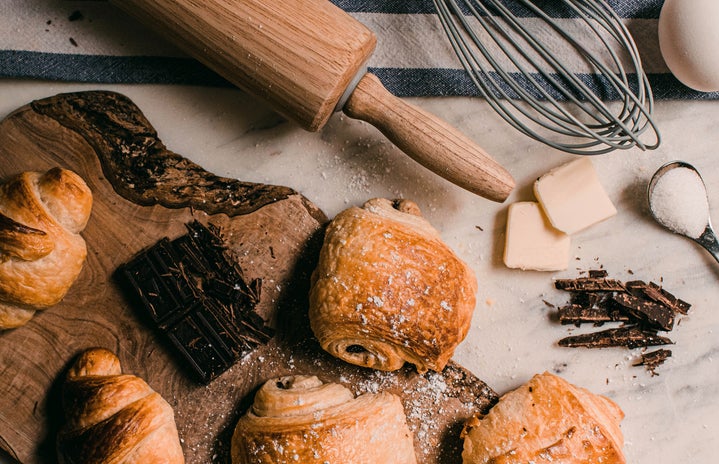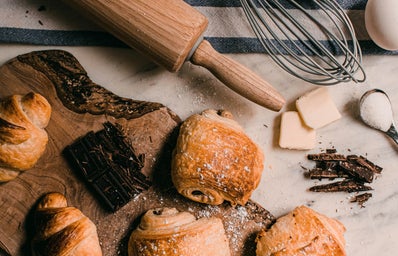I’m kind of a snob when it comes to TV. I’ve watched a lot of it and I can be pretty picky and critical when it comes to choosing a new series to watch. I particularly dislike reality TV. I feel that it’s often staged and just cheap melodrama. And I understand why producers edit some drama into these shows—nobody wants to watch an hour of crickets chirping. But knowing that reality TV is not real at all, why not just watch fiction, which is at least honest in its self-description and contains much better storylines? Some of my friends, however, insisted that I watch The Great British Baking Show, saying that they’ve never met someone who didn’t enjoy it. So, I watched it despite my biases against reality TV.
The premise is simple: a bunch of amateur bakers compete in baking challenges, with one contestant being sent home by the judges at the end of each episode until the best is left standing. Interestingly, the winner does not receive a monetary prize.
Luckily, the show is available for free on CBC Gem. I was told to start watching from season 2, so here are my first impressions of season 2, episode 1 of The Great British Baking Show. In short, I found the show delightful and I completely understand its appeal, so I’ll share why I think it works so well. Fair warning that there are a couple of small spoilers ahead.
Sincerity, or the Last Thing I Expected from Reality TV
First of all, this show feels a lot less staged and contrived than most reality TV I’ve seen. Based only on the first episode of the second season, all the contestants seem like pleasant and well-adjusted people, a rarity in this TV genre. There are no contrived rivalries or sense of animosity between the contestants—probably because there isn’t a prize to be won—but still, it’s nice to watch. The contestants are really just there for the love of baking and in the name of good fun. There’s obviously still competition in the air, but there’s also friendly sportsmanship. The personas of the contestants aren’t exaggerated to make the show more interesting either, and they feel just like regular people you would bump into on the street.
The reactions of the contestants also seem relatively candid. For example, Simon actually looks like he’s about to cry when the judges tell him they don’t like his boozy cupcakes. There was something really childlike and innocent about the contestants vying for the judges’ approval and then becoming discouraged and teary-eyed if they didn’t receive it.
The judges were quite sweet as well, although there was also a sort of good cop-bad cop dynamic going on between them that I also liked, with Paul having almost no filter and straight up telling contestants that their pastries were bad, versus Mary being somewhat gentler in her criticisms. When Rob drops his cake on the floor, he gets flustered and starts swearing under his breath, but the judges help him salvage whatever is left of his cake. I loved that because a character like chef Gordon Ramsay would have melodramatically yelled at him for being an idiot or something, but there’s none of that here.
A Slight Tangent About Some Random Associations
My experiences watching The Great British Baking Show for the first time also brought about a lot of associations. Just a few minutes into the show, I started thinking about one of my favorite YouTube series I like to binge-watch at night: The Victorian Way, a Victorian cooking show on the English Heritage channel hosted by none other than the reincarnated Mrs. Avis Crocombe. And sure enough, hosts Mel and Sue visit Audley End House later in the episode to talk about food history with an expert. And where did Mrs. Crocombe live and work? Audley End House, of course.
The show also got me reminiscing about another of my favorite cooking channels on YouTube: How to Cook That, hosted by food scientist Ann Reardon. One of the ingredients that the contestants had to incorporate into their tiered cakes was tempered chocolate, and I remembered that I learned about this process years ago from Reardon in this video. I love her channel because she has a degree in food science, so her approach to baking and testing recipes is really methodical and scientific. My favorite series of hers is her Debunking Videos, where she debunks fake (and sometimes dangerous) recipe videos made by content farms like Five-Minute Crafts.
I think that the reason the show reminded me so much of How to Cook That was its focus on the technical aspects of baking. The hosts commonly narrated and explained the food science behind the different recipes the contestants made, and part of what makes the show so pleasant to watch is this added educational component. It reminded me quite a bit of Food Insider YouTube videos too. This became all the more obvious to me when I watched the Canadian spin-off of The Great British Baking Show, aptly called The Great Canadian Baking Show. This spin-off doesn’t include the voiceovers by the hosts explaining the food science of the recipes presented, and it makes it a much less compelling show by contrast.
Food, History, Politics, and Patriotism
Finally, I loved the educational aspect of the show in terms of history. In between challenges, the hosts visit historical sites to talk with experts about the food history of the recipes that the contestants have to make. I thought this was a great way to keep viewers entertained while the bakers did their thing. For example, the history of cupcakes is discussed, and we learn that these pastries became popular when afternoon tea became common for ladies because they represented gentility and daintiness. We also learn about the history of the Battenberg cake, a characteristically British cake ironically created by a German cook for the marriage between Princess Victoria and Prince Louis of Battenberg in 1884.
I loved the idea of using baking and food as an entryway to learning about British history and history in general. As a political science student, it got me thinking about some of the food history courses we have in my department and about how food is inextricably linked to politics and history. It was cool to see how much culture is actually infused in the everyday pastries that we eat but don’t really consciously think about from day to day, and I really appreciated that aspect of the show.
What really got me was when we were introduced to guest Mike Tomkins. Tomkins was chosen to create Sir Winston Churchill’s 80th birthday cake when he was just 26 years old. Along with host Mel, he recreates that same cake from all those years ago in his still-running bakery. During the taste test, Mel comments that the cake is like a piece of history, and a teary-eyed Tomkins reminisces about the course of his life and tells her that baking the cake for Churchill was the peak of it. He gets a little bit patriotic too, building on the narrative that Churchill was a hero of World War II who saved Europe from fascism. This was the most touching moment of the episode for me because you could really see how much the cake meant to Tomkins. I don’t know what it is, but it’s always a mention of history and legacy that gets me weepy and sentimental. It brought me back to “One Last Time” in the Hamilton soundtrack, where President Washington resigns and looks back on his legacy.
Now, I didn’t like that the show took a wholly sentimentalized, uncritical view of history by glossing over the more problematic associations of the historical sites, characters, and recipes featured, such as to slavery, racism, and imperialism. Maybe they didn’t want to get “political” or curb the lighthearted nature of the show? Anyway, I hope this was something that was changed in later seasons and that a more nuanced, less blindly patriotic look at history and food was undertaken then.
Final Thoughts
The Great British Baking Show is one of those rare reality TV shows that is actually worth your time. The show is more sincere than melodramatic compared to most reality TV and the camaraderie between the contestants is a breath of fresh air. It incorporates snapshots of food history and technical explanations of food science to both entertain and educate viewers. It reminded me of a lot of other media I’m into, like YouTube cooking series and channels like The Victorian Way, How to Cook That, and Food Insider, and even the Hamilton musical soundtrack. What makes The Great British Baking Show so special is that it manages to juggle so many different genres of TV and video. It is at once a reality TV show and an educational documentary, with a cast of genuinely pleasant and talented people. I would gladly recommend the show to any viewer, including other TV cynics like myself.


